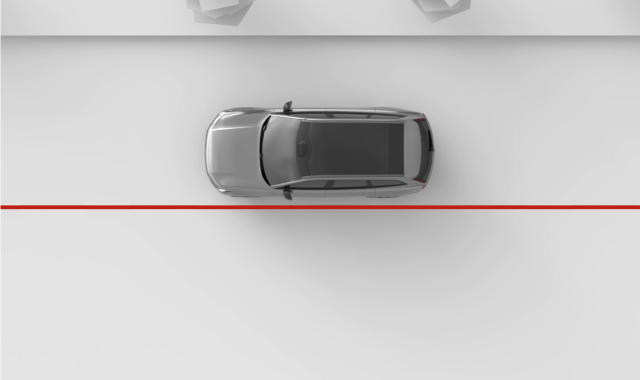
When lane keeping aid is enabled, the car can alert you if you are about to drift out of your lane. It can also perform steering interventions. Lane keeping aid depends on the car's forward-facing camera to identify road markings and your position in the lane.
Warning
Main conditions for lane keeping aid
- Your speed must be in the range 60-180 km/h (40-110 mph).
- The lane markings must be clearly visible for the car's camera to see.
- The lane must be wide enough. A very narrow lane does not provide enough margin between the car and the road markings.
- You must keep your hands on the steering wheel and actively steer the car.
Important
Steering actively
Never let go of the steering wheel when driving. Do not dismiss the car's requests for you to steer actively and keep your attention on the road.
Lane keeping aid intervention types
| Steering intervention | The car tries to steer back into the lane. |
| Lane departure warning | The car alerts you using sound and steering wheel vibrations. |
Note
Indicating a turn or lane change
As long as you use the turn indicators when changing lanes, the car assumes it's an intentional manoeuvre.
Cutting a corner
Lane keeping aid may allow you to briefly cut across the line at sharp corners.
Safety interventions are always enabled
Some situations can cause a steering intervention to prevent a dangerous lane departure even if lane keeping aid is turned off in settings.
Display symbols and communication
Lane keeping aid warnings and interventions are communicated in the driver display.
 | This symbol appears if you are coming too close to the lane markings. The symbol is mirrored during left-hand side warnings. |
 | This symbol indicates that lane keeping aid is disabled in settings or temporarily unavailable. |
 | This symbol appears when there is a lane keeping aid malfunction. This means that lane keeping aid and safety interventions to prevent lane departures are disabled. |
Conditions and limitations
For lane keeping aid to work, road markings must be present and visible. The car identifies them using a forward-facing camera. This form of detection requires that the camera view is unobstructed and that the conditions for visual detection are present. Read the separate section about the conditions and limitations of your car's cameras to understand how features relying on camera detection are affected.
- Lane divisions and mergers can cause temporary misidentification of the lane.
- Non-standard or unusual road marking layouts might not be identified correctly by the car. For example, road work or traffic diversions can result in conflicting or multiple sets of road markings.
- The car may be unable to detect deteriorated road markings, for example if they are worn, misshapen or discoloured.
- Other edges or lines can be misidentified as road markings, such as kerbs, road surface repair edges, barriers or well-defined shadows.
- Road markings must be sufficiently illuminated to be detected. In low-light conditions, they need to be illuminated by the car or street lights.